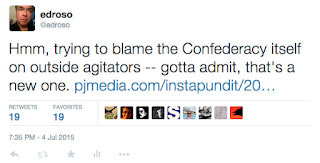HOPE FOR AMERICA'S FUTURE.
Hope y'all had an excellent Fourth. As I write, the local hooligans are still setting off their bottle rockets and M-80s, so the dog isn't happy. But I am, because I've spotted what may be the meme of the year, and a great development for the Republic: The conservative movement disowning not the Confederate Battle Flag -- to be fair, they probably aren't disowning that anytime soon -- but the Confederacy itself.
By which I mean, they aren't saying they were wrong to grab and hoist the Old Standard of the Lost Cause when the Democrats dropped it in the Civil Rights Era -- they're saying the South was never behind the Confederacy in the first place.
Attend Ole Perfesser Instapundit:
JACK NEELY: Was The South Ever Confederate Anyway?
The Civil War is a big bagful of ironies and paradoxes, and not a recommended study for folks who like to keep things simple. It would be a particular challenge for anyone to survive the 1860s in Knoxville and either idealize one side or demonize the other. It took a later generation, one that didn’t remember the war, to glorify it.
I do want to point out something provable. Whether the Confederate flag is an irredeemably racist and oppressive symbol or not, the Confederacy is not “the South.” It is not “the South now,” certainly. It was not even “the South” in 1861. The conflation of the Confederacy with “the South” began, I suspect, as some tired editor’s attempt to make a headline fit.
People of European and African ancestry have been living in the South for 400 years. The Confederacy lasted for four years, about 1 percent of that time. And even during that 1 percent, a large proportion of the people who lived in the South—perhaps even a majority—were skeptical of the Confederacy. . . .
The Confederacy was not universally popular, even in the South. It would be difficult to prove that as much as half the people who lived in the South in 1861 were fond of the Confederacy. Sam Houston, who grew up in East Tennessee and spent his entire life in the South—except when he was in D.C., representing Southern states in Congress—despised the Confederacy and denounced it publicly. David Glasgow Farragut and Gen. William Sanders—whose last names survive in multiple institutions in Knox County—both grew up in the South and fought against the Confederacy. Sanders, who’d spent most of his life in Kentucky and Mississippi, was killed by Confederate bullets. Several of Knoxville’s fiercest Unionists, Parson W.G. Brownlow, William Rule, and Thomas Humes, were lifelong Southerners.
It might take years to do a thorough study on the subject, but judging by what we know of those who favored secessionism or the Union, here in East Tennessee at least, Confederate sympathies didn’t necessarily suggest Southern roots. Many of Knoxville’s notable Confederates were immigrants from Switzerland, Germany, or Ireland. John Mitchel, probably Knoxville’s most nationally famous secessionist—editor of The Southern Citizen, which advocated slavery—was an Irish revolutionary Unitarian who’d spent several years in prison in Tasmania and never laid eyes on the South until 1853. J.G.M. Ramsey, the secessionist most influential locally, was from a Pennsylvania family. Father Abram Ryan, Knoxville’s “Poet-Priest of the Confederacy,” grew up in Maryland and Missouri, son of Irish immigrants. Thousands of New Yorkers, many of whom had never seen the South, were Confederate sympathizers.
Meanwhile, many of Knoxville’s Unionists grew up in multi-generational Tennessee families. Did Southern heritage even play a role in affiliation with the Confederacy? Here in Knoxville, a demographic study might even prove the opposite. Maybe it was the people with the deepest roots here who were most skeptical of the noisy rebel bandwagon.
In any case, in 1861 more than 30 percent of Tennessee’s Southerners voted against secession, against joining the Confederacy. Well over 30,000 Tennesseans took up arms against the Confederacy.
Yes, but the important point is letting low-information white Democrats feel superior.
It would appear Neely's trying to tell us that first, Tennessee wasn't entirely united for secession -- which is certainly true -- and second, that neither was the rest of the Confederacy, therefore the South wasn't really for secession, at least not until they were bamboozled by "immigrants from Switzerland, Germany, or Ireland," which is ridiculous -- rather like the protestations of those large numbers of Germans who after WWII declared they had during the recent unpleasantness been in the underground, or Switzerland, but in any case certainly didn't like what the Hitler fellow was doing without their notice. The Southerners' elected representatives voted secession, and hundreds of thousands of Southerners marched for Treason In Defense of Slavery. If they aren't accountable, no polity is.
The Perfesser adds the perhaps unneeded gloss: that the idea that the Confederacy was a Southern thing is just another way we Northerners oppress Southern whites. I noted this on Twitter --

-- which led to the usual festival of shirt-retuckers demanding that I "research" the Free State of Jones and referring me to contrarian essays like 2006's "The Myth of 'the Southern Strategy,'" which asserts that Southern whites only switched to the GOP in the Nixon era because it made economic sense to do so, not because of race (but declined to speculate as to why Southern blacks didn't follow their lead).
They're annoying, but with their annoyance comes this silver lining: These guys seem ashamed of the Confederate legacy, and whether they're sincere about it or (more likely) totally cynical doesn't really matter. With so many wingnuts crying tyranny-'n'-oppression just because private businesses are failing to fly their Battle Flag for them, that conservatives are even tendentiously abandoning the Lost Cause is a healthy development. We should encourage them in this, just as we should encourage them when, some years in the future, they claim they were never against Obamacare. Let us clasp hands o'er the bloody chasm!

